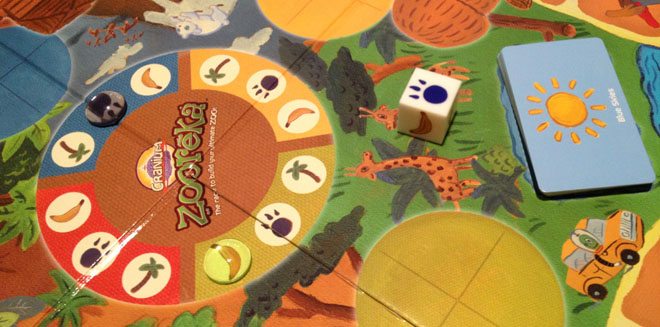Once when I was about 11 years old, my father made a deal with me that he would give me half of whatever was inside the coffee can on his desk if I were to give him my entire allowance for the month. My allowance was $5, a fortune in my 11-year-old head. You could buy an audio cassette for $5. You could go to the movies for $5. I agonized over the decision even though my sister took the deal in a heartbeat. My father waited until I gave in to the deal to remind me in an exasperated voice that he is my father, an unlikely person to try to screw me out of my allowance money. You can trust a bet made with your parents. Sure enough, the coffee can contained $174 worth of coins.
I thought about that this week when I made a bet with the twins as we played Zooreka. If either of them won, they could both stay up 15 minutes later that night. If I won, they would go to bed five minutes earlier. The odds were in their favor as there were two of them and only one of me, but they still agonized over whether to accept the bet. Simple math, I explained to them: they could win more than they could ever lose.
When they finally did accept my bet, I played without taking advantage of any of the statistical factors I’ve noticed about the game, instead letting fate take its course. They won, and elated by the win and the later bed time, they decided to enter a second round of Zooreka betting.
This time, if they won, they would get ice cream after school the next day. If I won, they would have to listen to my music in the car for a week without complaints. We also made a second bet because we intended to play to the second winner: If they won, they would get a second dessert the next day but if I won, they had to try a bite of a new food.
Unlike me with my father, they shouldn’t have trusted me with that bet.
My plan was to hold back and allow one of them to win the first round so we could all get ice cream — something I wanted, too. My second plan was to take advantage of those statistical factors I noticed about the game — since they really didn’t need a second dessert — and make the kids try this tofu recipe I had bookmarked earlier in the week. Cue evil laugh track and imaginary mustache twirling.
In order to put this plan in effect, I needed to play better this time, only losing the first round by a little bit so I’d be poised to spring ahead during the second phase. This made my daughter very nervous, and she started to whine about how well I was doing and how worried she was that they wouldn’t get ice cream the next day. Like my father, I wanted to remind her that I’m her parent and a good person to trust. Except that I’m obviously not trustworthy since I was also going to make her try a tofu banh mi.
So I gave them all the same knowledge I had to level the playing field. Zooreka comes with a six-sided die that you roll to collect the items you need to build your zoo. Three of the sides contain a picture of a banana. Two of the sides show a paw print. One of the sides has a palm tree. In order to make each of the four habitats for your zoo, you need to collect four bananas, two animal paws, and one tree. The way you collect the item is you predict which side the die will land on before the roll. If you choose the banana and it lands on banana, you get the banana. If you choose the animal paw and it lands on the banana, you get nothing.
But there are trades that can occur. One animal paw is equal to three bananas. One tree is equal to two animal paws which means it’s also equal to six bananas.
I took out a piece of paper and started writing out fractions:
3/6th of the time, or 50%, the die should fall on the banana. Within 10 rolls, a player should statistically have five bananas.
2/6th of the time, or about 33%, the die should fall on the animal paw. Within 10 rolls, a player should statistically have 3(ish) animal paws which also equals nine bananas.
1/6th of the time, or about 17%, the die should fall on the tree. Within 10 rolls, a player should statistically have 1(ish) tree which also equals six bananas.
In other words, if you want bananas, don’t choose the banana option.
To make the point, we started over the game and I chose the banana every roll. They chose the animal paw every roll. They had all four habitats while I was only able to build two. Simple math wins every time.
We still got ice cream the next day because I’m a nice person. Oh, and because I want them to trust me and make future bets since I fully intend to make the tofu banh mi the next time they lose.



How in the world can you get ahold of this game now?! I played it with some family friends a few years back and loved it. Now that my son’s getting old enough for board games, I can’t find it anywhere: just the occassional $50 “deal” on amazon.
I think that’s unfortunately the cost of the game: http://www.smarteducationaltoys.com/p/crn152615/cranium-zooreka-board-game.htm